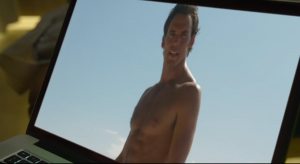
“Me Before You” Says to the World: A Man With Disabilities Can’t Be a ‘Real Man’
Disclaimer: This piece contains mild spoilers from the film.
So, I watched Me Before You. There are so many things that are bad about this movie that I don’t even know where to start. There is of course the widely denounced and criticized implicit message that quadriplegic people are better off dead than alive. But there are also so many other problems in the movie that not only fuel this harmful representation of people with disabilities but also propose ludicrous ideas for everyone.
[quote align=”center” color=”#999999″]”…this movie’s particular depiction of disability is intricately intertwined with our society’s problematic idea of what it means to be a man.”[/quote]
For example, the implication that you have to be filthy rich to live life to the fullest. Or that men get to make decisions about what makes them happy, but women get told their happiness is not enough. It is downright frightening that the connection between depression and suicide wasn’t even addressed in this movie. But what struck me the most by the time the credits rolled is how much this movie’s particular depiction of disability is intricately intertwined with our society’s problematic idea of what it means to be a man. The movie is implying that you cannot have a severe disability and be a man.

Lou finds a video of Will before his accident. We’re led to see him as a sort of ripped, dashing super-man. (photo credit: YouTube theatrical trailer screenshot)
Here’s an example of what I mean. Will is a quadriplegic 30-something-year-old who became paralyzed after an accident and no longer wants to live. In a scene in the movie, Lou- the caretaker- is discussing with Will’s parents a fun trip she’d like to plan for him. The parents are delighted and the mother says that she’ll clear Will’s schedule. The father says, no she should let Will himself do it because (and I wrote this one down in the theater to make sure it’s verbatim): “Will needs to be allowed to feel like a man.” Note, he did not say that Will should feel like he is independent, or that he should be given responsibility for his own schedule. He is conflating masculinity and independence. And of course, this is a damning perspective because Will, as a quadriplegic man, depends on others for everyday living, which according to this exchange means he is not a man.
Here is another scene that tipped me off that I should understand that Will’s quadriplegia is equated with loss of masculinity: Lou finds his pre-paralysis birthday video where he is depicted with ripped abs performing remarkable feats of athleticism and strength. The video literally portrays Will as James Bond and has his friends saying that he is a man who has out-Bonded James Bond himself. Lou then closes the video when the post-accident Will wakes up in his bed, unable to move the majority of his body. If this is not already beating us over the head to let us know that we should mourn the loss of his agility and masculinity, there are plenty of other scenes that repeat the sentiment, including Lou’s boyfriend saying that she should of course leave him should he ever become paralyzed. But there is a scene where Will puts his feelings into his own words.
He is sitting next to Lou in the car (that is fully adapted for his needs) and says, “I don’t want to go in yet. I just want to be a man who’s been to a concert with a girl in a red dress a few minutes more.” Let’s ignore for a second the choice of words where he is a man and Lou is a girl, not a woman, and let’s try to unpack this statement. He seems to be implying that if he goes inside the house—which is fully adapted for his needs and sits next to a castle that is also wheelchair accessible—his whole identity will somehow change. It sounds an awful lot like he’s saying “when I go in I’ll just be a wheelchair user and not a man” as if the two are mutually exclusive.

We are led to feel bad for Will after the accident because he is no longer a ripped, dashing super-man. (photo credit: YouTube theatrical trailer screenshot)
What’s worse than all the cues meant to tell us that Will is no longer a man is the fact that we are meant to understand that this is why he wants to die. At the teary-eyed revelation when Will is at the beach on some gorgeous island to which he had just flown—in what appears to be a private jet—to have fun with Lou, he tells her that he cannot live because he wouldn’t want her to “miss all of the things that someone else can give you.” Considering that he as a good-looking, kind, and smart multi-millionaire can give Lou nearly everything she could think of, it’s pretty clear that we’re supposed to recall the birthday video and understand that he can’t give her a life partner who is going to flaunt his six-pack abs as he cliff-dives into the sea. Forget love, success, humor, and wealth. It doesn’t matter if you can’t do stereotypically manly things. Like the things he says he couldn’t do to her when he sees her naked. Because apparently, the fact that quadriplegic men can have sex isn’t good enough for Will Traynor.
If you’re still not convinced that his desire to die isn’t inextricably linked to the perceived loss of his masculinity, let’s do a thought experiment. Swap the two main characters’ genders: Lou, the caretaker becomes Lou, the wealthy, good-looking quadriplegic wheelchair user, and Will, the person with a disability becomes Will, the poor, good-looking, quirky, golden-hearted caretaker. Okay, hold that picture in your head and go over all the above examples of hyper-masculinity with roles reversed. The movie plot already hardly makes sense, but with the genders swapped it makes no sense whatsoever. It becomes painfully obvious that we’re supposed to think that his life is no longer worth living because he can no longer be a man. Or rather the independent, near-superhuman male specimen that he was. This is the most toxic portrayal of masculinity I’ve seen in years.
I was open to being convinced that Will’s choice, with the right level of nuance, may even be understandable despite being disagreeable. But it’s only understandable if we buy the premise that the only way a man can exist in the world and feel like a man is to be handsome, wealthy, smart, successful, athletic, and sexually virile. This is a horrid representation of masculinity. It’s a horrid representation of disability. And what is most horrifying is imagining movie-goers actually buying into this kind of story. Meanwhile, monitoring of real human beings who have requested assisted suicide shows that those whose living conditions improve during the waiting period, those whose everyday needs are met, and who have companionship and care no longer want to die. Me Before You’s idea of what it means to “live boldly,” with or without disability, is simply absurd.
About the author Kristina Kopić, better known as Tina, is a former academic, a writer, a martial artist, and a fan of deconstructing all social constructs, especially those of gender, race, and disability in order to expose and challenge their injustices and create a more inclusive and fair world. She is the Advocacy Content Specialist at the Ruderman Family Foundation, lives with her wife, their two cats, and is currently dabbling in rugby.
Stay Included
To stay up to date on our most recent advocacy efforts, events and exciting developments, subscribe to our newsletter and blog!



















